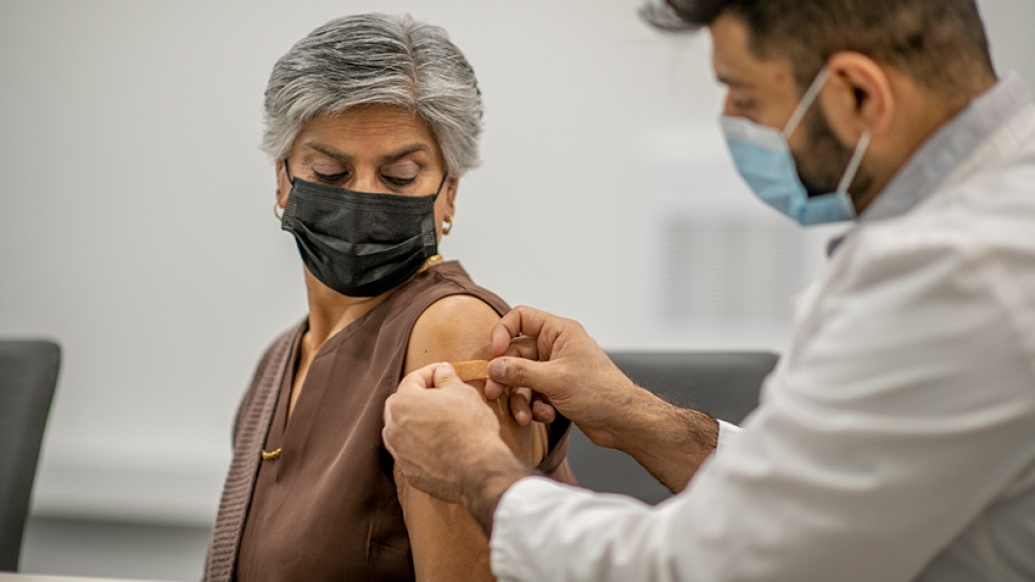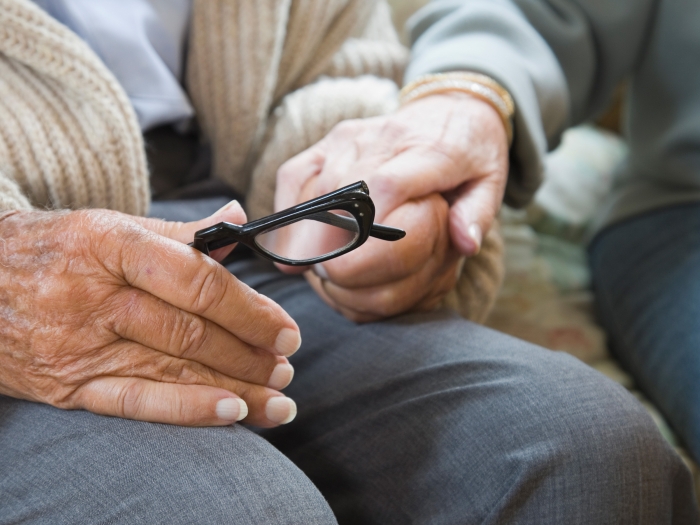Poll shows majority of people over 50 have already gotten or intend to get both, with a higher likelihood among those over 65.
5:00 AM
Author |

With two viruses threatening to make older adults sick this winter, a new poll shows most people over 50 have gotten vaccines to protect them against both influenza and coronavirus, or plan to. And a majority of those who have gotten the COVID-19 vaccine plan to get an additional dose to boost their level of protection.
But the poll, taken in mid-October, also reveals major differences in vaccine attitudes between older adults of different age groups, racial and ethnic backgrounds, and other characteristics including personal political leaning.
The new findings come from the National Poll on Healthy Aging, based at the University of Michigan Institute for Healthcare Policy and Innovation, and supported by AARP and Michigan Medicine, U-M's academic medical center.
The poll finds that 1 in 3 older adults feel it is more important to get vaccinated against the flu this year than in years before the COVID-19 pandemic. Almost all of the rest said the importance this year is the same.
SEE ALSO: Big Shift Seen in High-Risk Older Adults' Attitudes Toward COVID-19 Vaccination
Experts are concerned about a "twindemic" of flu and COVID, mainly among the unvaccinated and also among vaccinated people whose immunity is low because of other factors. That's because other measures that kept flu activity extremely low last winter have largely ended. Flu season has just begun, and COVID activity in most of the country is still above CDC's high level, though the daily number of new cases is dropping in many states.
More findings from older adults polled about both flu shots and COVID vaccines
Last year's flu shot:
-
In all, 54% of people between the ages of 50 and 64 say they got a flu shot last year, much lower than the 83% of those over 65 who said they did.
-
There weren't major differences in 2020 flu shots by gender, race/ethnicity, income or living situation, but there were based on political party identification. Those living in the South were also less likely that those in other regions to have had a flu shot in 2020.
This year's flu shot:
-
Sixty-four percent of people between the ages of 50 and 64 say they've already gotten their flu shot this year or they're likely to, while 86% of those over 65 say they already have or are likely to.
-
Those over 65 were nearly twice as likely as those aged 50 to 64 to have already gotten their flu shot by the time the poll was taken in mid-October (47% vs. 28%).
-
Most (87%) of respondents who identified as Democrats said they had already had a flu shot or planned to get one, compared with 67% of Republications and 60% of independents.
COVID vaccination: Past, present and future
The National Poll on Healthy Aging has asked older adults about their plans to get vaccinated against COVID twice before, in October 2020 before any vaccines received emergency use authorization, and in January 2021 once vaccination had begun.
SEE ALSO: Flu Shot Associated With Fewer, Less Severe COVID Cases
Now, the new poll gives an indication of how many have actually gotten the COVID vaccine, though the methodology and sample size for the new poll is slightly different, and the sample includes a small subset of people up to age 95, instead of age 80 as in the previous two polls.
-
Overall, 76% of those age 50 to 64 and 87% of those over 65 said they had gotten vaccinated against COVID. The poll did not ask if they had received both doses of a two-dose COVID vaccine.
-
Eighty percent of white respondents said they had gotten vaccinated against COVID, up from 72% who said in January that they had gotten a dose already or intended to, and from 63% who said a year ago that they would likely get vaccinated when it became available.
-
Eighty-two percent of Black respondents said they had gotten vaccinated, up from 60% who said it was likely or they'd started vaccination in January, and from 40% who said it was likely a year ago.
-
Among Hispanic respondents, 88% said they are vaccinated against COVID, compared with 69% who said in January they were likely to get vaccinated or had started already, and 51% who said last year that they were likely to get vaccinated.
-
Democrats were more likely to have received the COVID vaccine (94%) than Republicans (71%) or independents (69%).
-
The vast majority (85%) of older adults who said they had gotten vaccinated against COVID also said they plan to get a flu shot this year or already had. But among those who had not yet gotten vaccinated against COVID, 66% said they didn't intend to get a flu shot.
We need to do a better job of helping some people, including those in their 50s and early 60s, understand that these vaccines can really protect them, their families and their communities.Preeti Malani, M.D.
"While I'm encouraged that most older adults are seeking this protection against two viruses that can make them seriously ill, these data show we need to do a better job of helping some people, including those in their 50s and early 60s, understand that these vaccines can really protect them, their families and their communities," said Preeti Malani, M.D., the poll's director and an infectious disease physician at Michigan Medicine who also has training in geriatrics.
Like Podcasts? Add the Michigan Medicine News Break on iTunes, Google Podcasts or anywhere you listen to podcasts.
COVID vaccine third doses and boosters
The poll was taken two months after the Food and Drug Administration and Centers for Disease Control authorized third doses of Pfizer and Moderna vaccines for adults with immune system issues, and a few weeks after the FDA authorized booster doses of the Pfizer vaccine for all adults over 65 and for high-risk adults of all ages.
Just after the poll was taken, the FDA gave authorization for booster doses for Moderna and Johnson & Johnson/Janssen vaccines, as had been widely expected.
Even in that short time, 13% of the vaccinated older adults who responded to the poll said they had already gotten a third dose or booster shot.
When asking about booster and third doses, the poll team focused on the 838 poll respondents who had said that they had already gotten their initial COVID vaccination. Because booster doses of all vaccines had not yet been approved at the time of the poll, the poll team grouped those who had gotten a third dose or booster, and those who said they planned to, together.
-
In all, 61% of vaccinated people age 50-64, and 78% of vaccinated people over 65, said they had or would get a booster or third dose.
-
Only 12% of vaccinated people in their 50s and early 60s said they did not intend to get a booster or third dose, and the percentage was even smaller (7%) in the over-65 group. The rest were unsure.
-
Democrats were more likely to say they had or would get another dose (83%) than Republicans (53%) or independents (62%).
Malani noted, "As we learn more about how the strong immunity given by the COVID vaccines changes over time, especially for people with underlying health risks that older adults are more likely to have, it's especially important to communicate the role of boosters and third doses based on individual risk."
The National Poll on Healthy Aging results are based on responses from a nationally representative sample of 1,006 adults over age 50 from the Foresight 50+ Omnibus panel, which draws from the Foresight 50+ Panel by AARP and NORC at the University of Chicago who answered a wide range of questions online and by phone in mid-October 2021. Questions were written, and data interpreted and compiled, by the IHPI team. Read past National Poll on Healthy Aging reports.

Explore a variety of healthcare news & stories by visiting the Health Lab home page for more articles.

Department of Communication at Michigan Medicine
Want top health & research news weekly? Sign up for Health Lab’s newsletters today!





